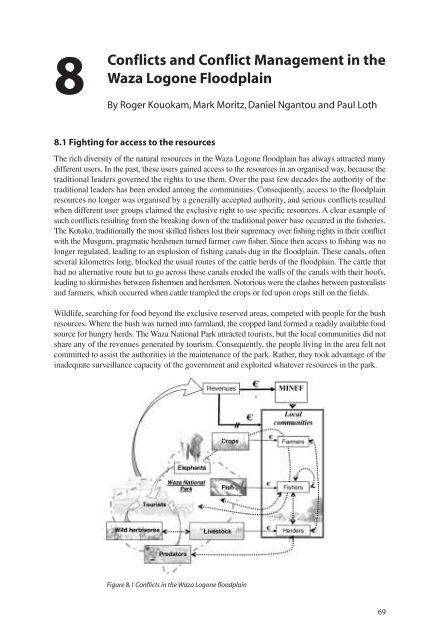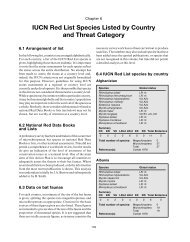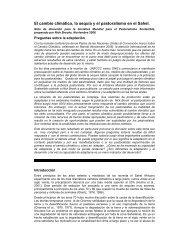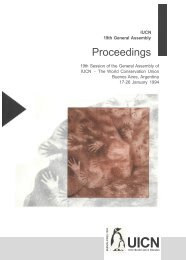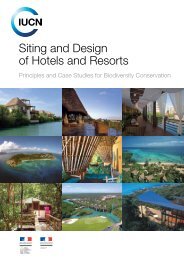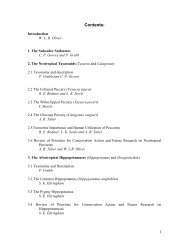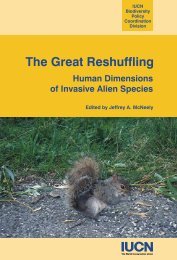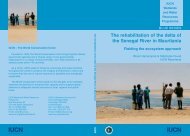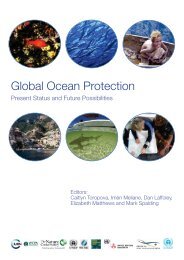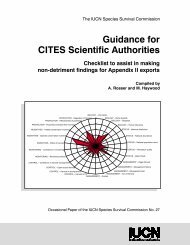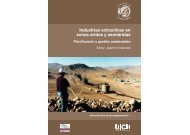The return of the water - IUCN
The return of the water - IUCN
The return of the water - IUCN
Create successful ePaper yourself
Turn your PDF publications into a flip-book with our unique Google optimized e-Paper software.
8<br />
Conflicts and Conflict Management in <strong>the</strong><br />
Waza Logone Floodplain<br />
By Roger Kouokam, Mark Moritz, Daniel Ngantou and Paul Loth<br />
8.1 Fighting for access to <strong>the</strong> resources<br />
<strong>The</strong> rich diversity <strong>of</strong> <strong>the</strong> natural resources in <strong>the</strong> Waza Logone floodplain has always attracted many<br />
different users. In <strong>the</strong> past, <strong>the</strong>se users gained access to <strong>the</strong> resources in an organised way, because <strong>the</strong><br />
traditional leaders governed <strong>the</strong> rights to use <strong>the</strong>m. Over <strong>the</strong> past few decades <strong>the</strong> authority <strong>of</strong> <strong>the</strong><br />
traditional leaders has been eroded among <strong>the</strong> communities. Consequently, access to <strong>the</strong> floodplain<br />
resources no longer was organised by a generally accepted authority, and serious conflicts resulted<br />
when different user groups claimed <strong>the</strong> exclusive right to use specific resources. A clear example <strong>of</strong><br />
such conflicts resulting from <strong>the</strong> breaking down <strong>of</strong> <strong>the</strong> traditional power base occurred in <strong>the</strong> fisheries.<br />
<strong>The</strong> Kotoko, traditionally <strong>the</strong> most skilled fishers lost <strong>the</strong>ir supremacy over fishing rights in <strong>the</strong>ir conflict<br />
with <strong>the</strong> Musgum, pragmatic herdsmen turned farmer cum fisher. Since <strong>the</strong>n access to fishing was no<br />
longer regulated, leading to an explosion <strong>of</strong> fishing canals dug in <strong>the</strong> floodplain. <strong>The</strong>se canals, <strong>of</strong>ten<br />
several kilometres long, blocked <strong>the</strong> usual routes <strong>of</strong> <strong>the</strong> cattle herds <strong>of</strong> <strong>the</strong> floodplain. <strong>The</strong> cattle that<br />
had no alternative route but to go across <strong>the</strong>se canals eroded <strong>the</strong> walls <strong>of</strong> <strong>the</strong> canals with <strong>the</strong>ir ho<strong>of</strong>s,<br />
leading to skirmishes between fishermen and herdsmen. Notorious were <strong>the</strong> clashes between pastoralists<br />
and farmers, which occurred when cattle trampled <strong>the</strong> crops or fed upon crops still on <strong>the</strong> fields.<br />
Wildlife, searching for food beyond <strong>the</strong> exclusive reserved areas, competed with people for <strong>the</strong> bush<br />
resources. Where <strong>the</strong> bush was turned into farmland, <strong>the</strong> cropped land formed a readily available food<br />
source for hungry herds. <strong>The</strong> Waza National Park attracted tourists, but <strong>the</strong> local communities did not<br />
share any <strong>of</strong> <strong>the</strong> revenues generated by tourism. Consequently, <strong>the</strong> people living in <strong>the</strong> area felt not<br />
committed to assist <strong>the</strong> authorities in <strong>the</strong> maintenance <strong>of</strong> <strong>the</strong> park. Ra<strong>the</strong>r, <strong>the</strong>y took advantage <strong>of</strong> <strong>the</strong><br />
inadequate surveillance capacity <strong>of</strong> <strong>the</strong> government and exploited whatever resources in <strong>the</strong> park.<br />
Figure 8.1 Conflicts in <strong>the</strong> Waza Logone floodplain<br />
69


